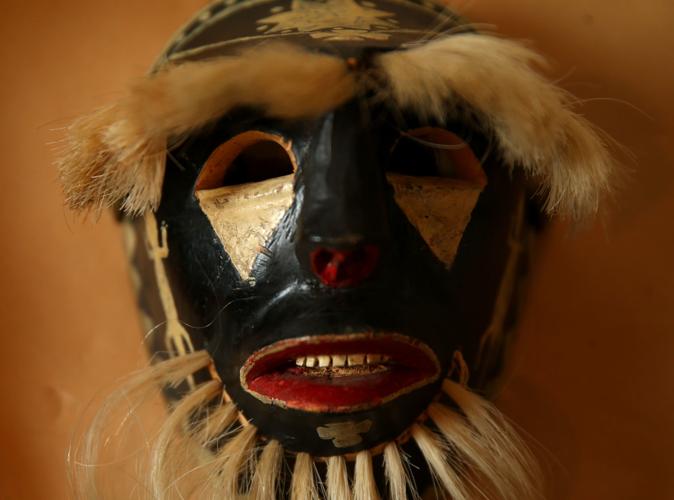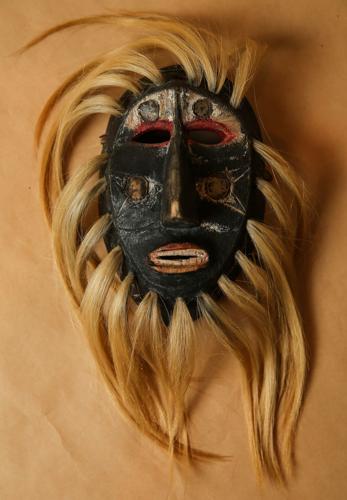In the Mayo and Yaqui communities, Pascola ritual dancers wear wooden masks during traditional ceremonies.
Starting Saturday, Oct. 26, those masks, which hold deep ritual significance, will be the focus of an exhibit at the Arizona State Museum, “Pahko’ora/Pahko’ola: Mayo and Yaqui Masks from the James S. Griffith Collection.”
James S. “Big Jim” Griffith, a Tucson anthropologist, collected the masks while conducting research, visiting several Mayo communities in both the Río Mayo and the Río Fuerte regions in southern Sonora, Mexico. He donated some masks to the museum in 2005. Others are on loan from the museum for the 14-month exhibit.
Some of the masks he donated are already on display as part of the museum’s permanent exhibit, “Paths of Life: American Indians of the Southwest.”
The Mayo are an indigenous community from a region in Mexico that covers Southern Sonora and Northern Sinaloa. The Yaqui tribe resides in northern Sonora and in Southern Arizona.
While there are variations in the significance of the masks for both cultures, the tribes are like cousins, says Santiago Benton, an indigenous language preservationist and co-curator of the upcoming exhibit.
The tribes celebrate many religious fiestas, most of which overlap with Catholic celebrations, like saints days and Holy Week leading up to Pascua, or Easter. Their indigenous traditions remain as Pascola dancers, and other performers celebrate and pray by dancing to the sounds of a cane flute, a hide drum, a violin and a harp.
“The Pascola dancer himself, he’s not just a dancer, he leads the ceremony,” Benton said. “He gives permission for the ceremony to begin.”
The Pascola dancer in the Mayo celebration has to wear a mask in order to say a sermon, Benton said.
Along with religious holidays, the traditional Mayo fiesta can be held during wedding celebrations, vigils and baptisms, Benton said. The ceremonies have allowed the Mayo to learn from their elders over the centuries, he said.
The new exhibit will also include the role of women in traditional fiestas, something that was missing from the permanent exhibit, said Diane Dittermore, associate curator of Ethnological Collections at the Arizona State Museum.
“That was actually a little bit of a gap in our permanent exhibit that we depict a fiesta and the women are absent from our diorama,” she said. “The people who helped put that exhibit together were men and at the time with the space we had we told one story.”
The women cook for the ceremony, preparing meals throughout the day and late into the night, Benton said. That role is highly respected, he said. Girls between 9 and 13 years old are bandederas, who use a flag to bless the ceremonial space and the altar. Angelitas, little angels, the youngest girls, also play an important role in the ceremony during Lent, Benton said.
The exhibit will also include Mayo and Yaqui languages, both written and spoken. Visitors will listen to the introduction in English, Spanish, Mayo and Yaqui. Quotes connected to the exhibit will be in English and in the language of the person who said the quote.
“We wanted to be able to hear voices directly from the people and so we worked through the Pascua Yaqui tribe, their Office of Language and Culture,” Dittermore said.
Benton, who teaches Mayo to youth, said he’s passionate about sharing the language and, in doing so, passing part of the tribe’s humanity to future generations.
“When you learn a language you see the world through those lenses,” he said. “It’s just really amazing, and the more languages you know you can see the world through those lenses.”
The exhibit, opening on Saturday, will include a Yaqui band “Los Hermanos Cuatro,” mask carving demonstrations and sales, tissue paper flower making, Yaqui musical instrument lotería and Yaqui artist sales. The masks in recent years have also become a collector’s item for anthropologists and art collectors, due to their aesthetic, cultural and spiritual values.









